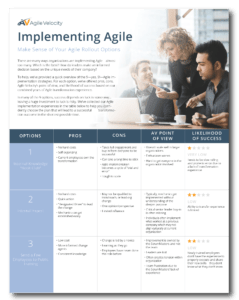What Does An Agile Coach Do?
We’d wager most people think of coaches in the context of sports – Vince Lombardi, Phil Jackson and Pat Summit. These are some of the greatest coaches in the history of sports, but coaches exist in every profession. Simply put, a coach (in any context) helps people, teams, and organizations perform better.

The same is true for Agile Velocity (AV) Coaches. AV Agile coaches help organizations by accelerating their adoption of Agile methods in order to better achieve their business objectives. Coaches use Path To Agility® to prioritize the business outcomes, identify, and coach to build the capabilities necessary to enable those results.
Agile Coaching to Levels
Building new capabilities is hard. It takes time and it will be met with resistance. Having a consistent, repeatable, proven approach is how AV Agile Coaches are able to get results. The Path to Agility® breaks down a business into three levels, each of which has a set of capabilities to master in order to achieve the targeted business outcomes. They are responsible for working with leaders, teams, and individuals at all three levels to instill the desired capabilities. They focus on business results, not just process change.
Following are the three business levels along with the key results our coaches are working towards:
- Organization – Leadership develops a modern mindset, increases visibility throughout the organization, and creates alignment around vision, goals, and measured success for sustainable organizational change.
- System – Networks of teams are coordinating and collaborating to address dependencies and reduce the time to market.
- Team – Teams successfully take on new roles, establish Agile team practices, increase engagement, learn faster, and can predictably produce value.
Agile Coaching For Growth and Results
Although the primary goal of an Agile coach is singular, to improve performance, there are many functions a coach performs on an engagement. The following highlights a handful of these. (For a deeper dive, see 7 Roles of an Agile Coach – Besides Agile Coach.) 
- Observer
- Teacher
- Partner
- Facilitator
- Advisor/Mentor
- Coach
As you can tell, AV Coaches aren’t just expected to be expert Agilists, they’re also expected to be well-rounded, growth-minded leaders. Our Agile Coaches are leaders that can have hard, honest conversations as well as listen with compassion. Leaders that can share knowledge and impart wisdom from their experience. Leaders, at their core, that want to help others improve, because they are coaches.
Ready to Improve?
At Agile Velocity, each of our coaches’ job is to work themselves out of a job. They do this by establishing core capabilities at all levels of an organization — making the organization self-sufficient and resilient. Our approach greatly improves the likelihood of long-term success.
When you’re ready to improve your organization’s performance by focusing on business outcomes like increased revenue, customer satisfaction, and speed of delivery, our coaches will be prepared with a solution tailored to your unique needs and desired business results.
For more on our approach to building lasting business agility, see Agile Velocity’s Transformation Services.



